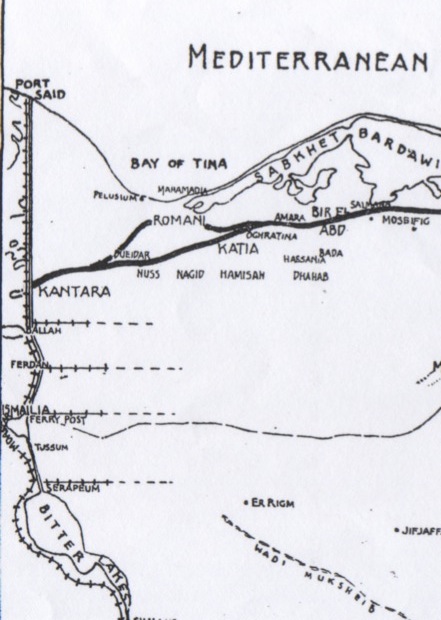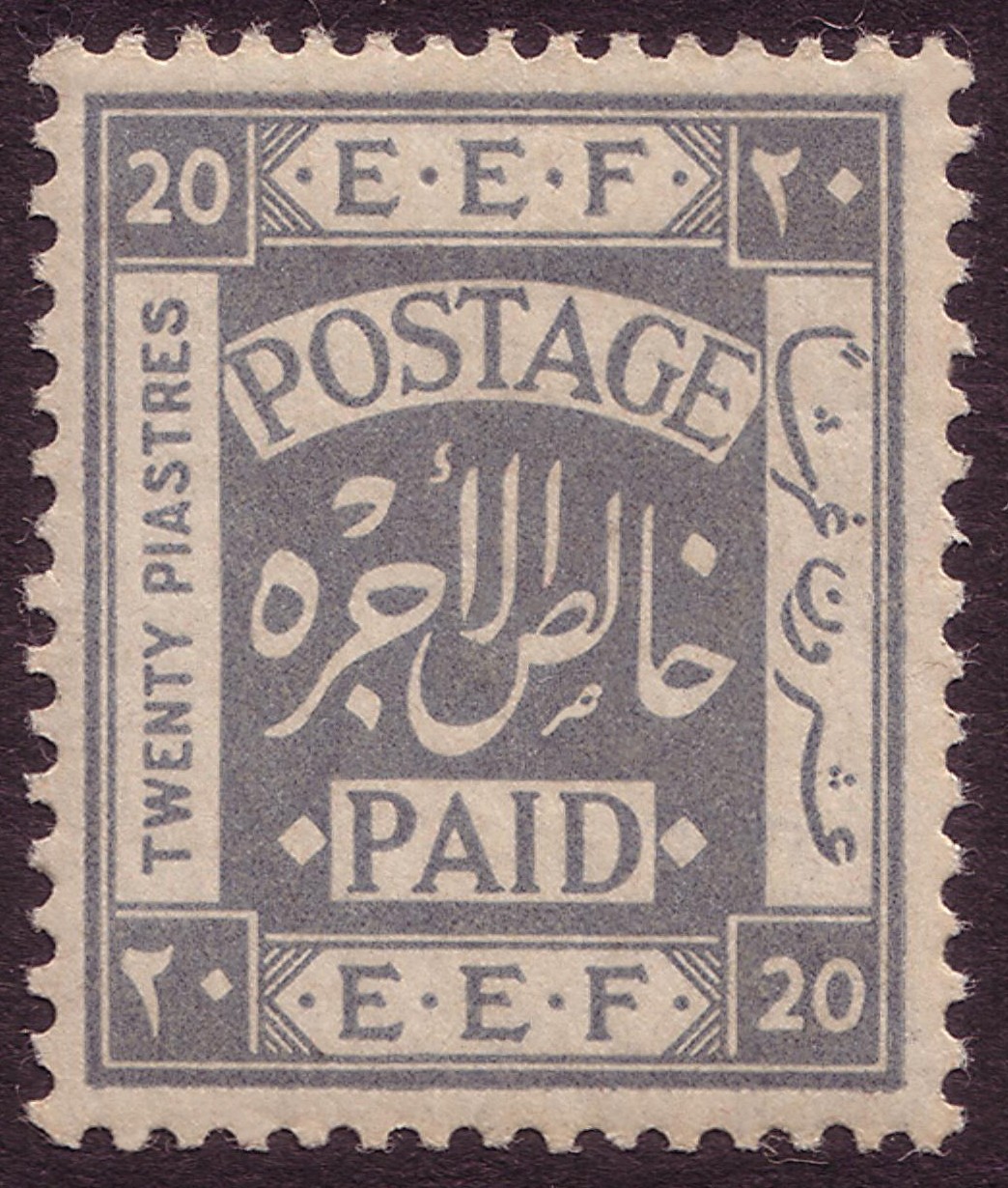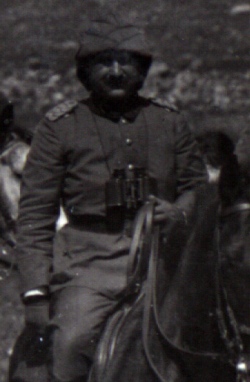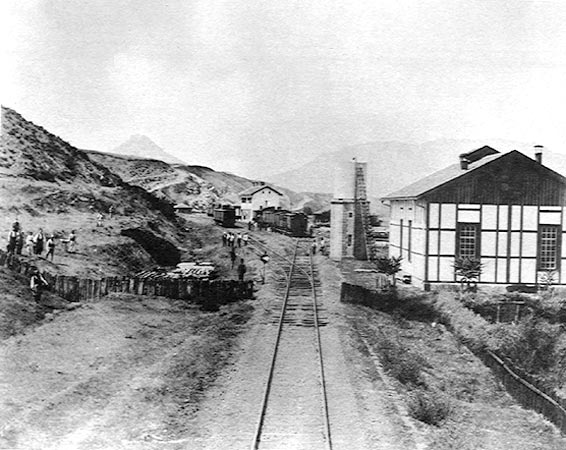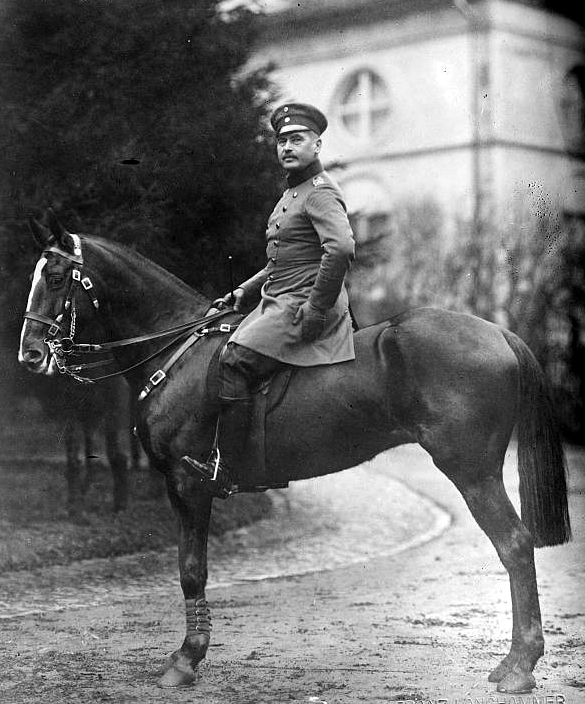|
Sinai And Palestine Campaign
The Sinai and Palestine campaign was part of the Middle Eastern theatre of World War I, taking place between January 1915 and October 1918. The British Empire, the French Third Republic, and the Kingdom of Italy fought alongside the Arab Revolt in opposition to the Ottoman Empire, the German Empire, and the Austro-Hungarian Empire. It started with an Ottoman attempt at raiding the Suez Canal in 1915 and ended with the Armistice of Mudros in 1918, leading to the cession of Ottoman Syria. Fighting began in January 1915, when a German-led Ottoman force invaded the Sinai Peninsula, then occupied by the British as part of a Protectorate of Egypt, to unsuccessfully raid the Suez Canal. After the Gallipoli campaign, British Empire veterans formed the Egyptian Expeditionary Force (EEF) and Ottoman Empire veterans formed the Fourth Army, to fight for the Sinai Peninsula in 1916. In January 1917 the newly formed Desert Column completed the recapture of the Sinai at the Battle o ... [...More Info...] [...Related Items...] OR: [Wikipedia] [Google] [Baidu] |
Middle Eastern Theatre Of World War I
The Middle Eastern theatre of World War I saw action between 30 October 1914 and 30 October 1918. The combatants were, on one side, the Ottoman Empire, with some assistance from the other Central Powers; and on the other side, the British Empire, British (with the help of Nili, a small number of Jews, Greeks, Armenians, some Kurdish tribes and Arab states, along with British Raj, Hindu, Sikh and Muslim colonial troops from India) as well as troops from the British Dominions of Australia, Canada, and New Zealand, the Russian Empire, Russians (with the help of Armenians, Assyrians, and occasionally some Kurdish tribes), and the French Third Republic, French (with its French North Africa, North African and French West Africa, West African Muslim, Christian and Traditional African religions, other colonial troops) from among the Allies of World War I, Allied Powers. There were five main campaigns: the Sinai and Palestine campaign, Sinai and Palestine, Mesopotamian campaign, Mesopo ... [...More Info...] [...Related Items...] OR: [Wikipedia] [Google] [Baidu] |
Hussein Bin Ali, Sharif Of Mecca
Hussein bin Ali al-Hashimi ( ; 1 May 18544 June 1931) was an Arab leader from the Banu Qatadah branch of the Banu Hashim clan who was the Sharif and Emir of Mecca from 1908 and, after proclaiming the Great Arab Revolt against the Ottoman Empire, King of the Hejaz, even if he refused this title,Representation Of Hedjaz At The Peace Conference: Hussein Bin Ali's Correspondence With Colonel Wilson; Status Of Arabic Countries; King's Rejection Of 'Hedjaz' Title. Paris Peace Conference 1919: Representation Of Hedjaz, Feb. 24, 1919, Manuscript Number FO 608/97-0068 The National Archives (Kew, United Kingdom) from 1916 to 1924. He proclaimed himself Caliph after the abolition of the Ottoman Caliphate in 1924 and stayed in power until 1925 when Hejaz was invaded by the Saudis. His Caliphate was opposed by the British and French empires, the Zionists and the Wahhabis alike. However, he received support from a large part of the Muslim population of that time. and from Mehmed VI ... [...More Info...] [...Related Items...] OR: [Wikipedia] [Google] [Baidu] |
Egyptian Expeditionary Force
The Egyptian Expeditionary Force (EEF) was a military formation of the British Empire, formed on 10 March 1916 under the command of General Archibald Murray from the Mediterranean Expeditionary Force and the Force in Egypt (1914–1915), at the beginning of the Sinai and Palestine campaign of the First World War. History Formed in the British protectorate of the Sultanate of Egypt, the initially small force was raised to guard the Suez Canal and Egypt. After the withdrawal from the Gallipoli campaign the force grew into a large reserve to provide reinforcements for the Western Front, while the Western Frontier Force fought in the Senussi campaign from 1915 to 1917 and the Eastern Force (EF) defended the canal at the Battle of Romani in August 1916. Following the victory at Romani, part of the Eastern Force pursued the Ottoman invading force back to Palestine after the victories at the Battle of Magdhaba in December 1916 and the Battle of Rafa in January 1917, by which ... [...More Info...] [...Related Items...] OR: [Wikipedia] [Google] [Baidu] |
Force In Egypt
The Force in Egypt was a British Army formation established in August 1914 to administer garrisoning armed forces in Egypt at the beginning of the First World War. The force had the objective of protecting the Suez Canal and was originally commanded by Major General Julian Byng, but he was replaced by General John Maxwell, who took command on 8 September 1914. Initially, the main threat to the Suez came from Germany and throughout the early months several of the force's elements were sent to Europe to take part in the fighting on the Western Front. On 5 November 1914, Britain and France declared war on the Ottoman Empire, after which the Force in Egypt faced a direct threat from Ottoman forces, which was realised in February 1915 with a raid on the Suez Canal. This threat remained until 1916 when the British forces went on the offensive. The composition of the force changed several times due to the varying availability forces. By the end of 1914, the forces deployed in defence ... [...More Info...] [...Related Items...] OR: [Wikipedia] [Google] [Baidu] |
Cemal Mersinli
Cemal Mersinli (1875 – October 7, 1941), also known as Mehmed Djemal Pasha (), Cemal of Mersin (), or Djemal Pasha the Lesser (; to distinguish him from the higher-ranking Djemal Pasha) was a Turkish general of the Ottoman and Turkish armies and a politician of the Ottoman Empire and the Republic of Turkey.Türk Parlamento Tarihi Araştırma Grubu, ''Türk Parlamento Tarihi, Millî Mücadele ve T.B.M.B. I. Dönem 1919-1923 - III. Cilt: I. Dönem Milletvekillerin Özgeçmişleri'', Türkiye Büyük Millet Meclisi Vakfı Yayınları, Ankara, 1995, , pp. 472-474. During the Arab Revolt, he led Turkish forces in an attack on Wadi Musa on 21 October 1917. The Turkish forces were defeated by forces under the command of Mawlud Mukhlis, Faisal's '' aide-de-camp''. He later participated in the Turkish War of Independence , strength1 = May 1919: 35,000November 1920: 86,000Turkish General Staff, ''Türk İstiklal Harbinde Batı Cephesi'', Edition II, Part 2, Ankara 19 ... [...More Info...] [...Related Items...] OR: [Wikipedia] [Google] [Baidu] |
Cevat Çobanlı
Cevat Çobanlı (14 September 1870Mesut Aydın, ''Türkiye ve Irak Hudûdu Mes'elesi'', Avrasya Stratejik Araştırmalar Merkezi Yayınları, 2001p. 53./ref> or 1871 – 13 March 1938) was a Turkish military commander of the Ottoman Army and a general of the Turkish Armed Forces who was notable for causing major Naval losses to the Allies during their Dardanelles campaign in World War I. Family Cevat was born on 14 September 1870 or in 1871 in Sultanahmet (Istanbul, Ottoman Empire) His mother was Emine Hanım and his father was Müşir Şakir Pasha, Chief of Staff of the Ottoman Army. His family is originally from Malatya. Education and military career After graduating from the Galatasaray High School, he enrolled in the Ottoman Military Academy (''Mekteb-i Fünûn-u Harbiyye-i Şâhâne'') in 1888. He graduated from the school as the fourth of his class in 1891 and joined the Ottoman military as an Infantry Second Lieutenant (''Mülâzım-ı Sani''). He continued his e ... [...More Info...] [...Related Items...] OR: [Wikipedia] [Google] [Baidu] |
Ismet Pasha
Ismet () is a Turkish form of the Arabic name Ismat which comes from Ismah. Along with Turkish, the name is also seen in Albanian, Bosnian, and Macedonian. The name means "honesty" or "purity" and in classical "infallibility", "immaculate", "impeccability" and "faultlessness". Given name * Ismet Ahmad (1945–2023), Indonesian politician and academic * Ali İsmet Öztürk (born 1964), Turkish aerobatics pilot * Ismet Akpinar (born 1995), German basketball player * Ismet Asllani (1955–1999), Kosovan businessman, humanitarian and army commander * İsmet Atlı (1931–2014), Turkish Olympic medalist sports wrestler * Ismet Azizi (born 1960), Kosovan professor and journalist * Ismet Bajramović (1966–2008), Bosnian soldier * Ismet Cheriff Vanly (1924–2011), Kurdish scholar and political activist * Ismet Đuherić (born 1949), Bosnian WWII army commander * Ismet Ekmečić (born 1969), Slovenian footballer * İsmet Ergün (born 1950), German artist and stage designer * Ismet ... [...More Info...] [...Related Items...] OR: [Wikipedia] [Google] [Baidu] |
Fevzi Çakmak
Mustafa Fevzi Çakmak (12 January 1876 – 10 April 1950) was a Turkish field marshal (''Mareşal (Turkey), Mareşal'') and politician. He served as the Chief of General Staff from 1918 and 1919 and later the Imperial Government (Ottoman Empire), Minister of War of the Ottoman Empire in 1920. He later joined the provisional Government of the Grand National Assembly and became the Deputy Prime Minister of Turkey, Deputy Prime Minister, Ministry of National Defense (Turkey), Minister of National Defense and later as the Prime Minister of Turkey from 1921 to 1922. He was the second List of the Chiefs of the Turkish General Staff, Chief of the General Staff of the provisional Government of the Grand National Assembly, Ankara Government and the first Chief of the General Staff of the Republic of Turkey. Graduating from the War College as a Staff (military), Staff Captain (land), Captain and assigned to the 4th Department of the General Staff, Mustafa Fevzi participated in numerous ba ... [...More Info...] [...Related Items...] OR: [Wikipedia] [Google] [Baidu] |
Mustafa Kemal Atatürk
Mustafa Kemal Atatürk ( 1881 – 10 November 1938) was a Turkish field marshal and revolutionary statesman who was the founding father of the Republic of Turkey, serving as its first President of Turkey, president from 1923 until Death and state funeral of Mustafa Kemal Atatürk, his death in 1938. He undertook sweeping Atatürk's reforms, reforms, which modernized Turkey into a secularism in Turkey, secular, industrializing nation. Ideologically a Secularism, secularist and Turkish nationalism, nationalist, Atatürk's reforms, his policies and socio-political theories became known as Kemalism. He came to prominence for his role in securing the Ottoman victory at the Battle of Gallipoli (1915) during World War I. Although not directly involved in the Armenian genocide, his government would later grant immunity to remaining perpetrators. Following the defeat of the Ottoman Empire after World War I, he led the Turkish National Movement, which resisted the Empire's partition ... [...More Info...] [...Related Items...] OR: [Wikipedia] [Google] [Baidu] |
Gustav Von Oppen
Gustav, Gustaf or Gustave may refer to: *Gustav (name), a male given name of Old Swedish origin Art, entertainment, and media * ''Primeval'' (film), a 2007 American horror film * ''Gustav'' (film series), a Hungarian series of animated short cartoons * Gustav (''Zoids''), a transportation mecha in the ''Zoids'' fictional universe *Gustav, a character in ''Sesamstraße'' *Monsieur Gustav H., a leading character in ''The Grand Budapest Hotel'' * Gustaf, an American art punk band from Brooklyn, New York. Weapons *Carl Gustav recoilless rifle, dubbed "the Gustav" by US soldiers *Schwerer Gustav, 800-mm German siege cannon used during World War II Other uses *Gustav (pigeon), a pigeon of the RAF pigeon service in WWII *Gustave (crocodile), a large male Nile crocodile in Burundi *Gustave, South Dakota *Hurricane Gustav (other), a name used for several tropical cyclones and storms *Gustav, a streetwear clothing brand See also *Gustav of Sweden (other) *Gustav Adolf ( ... [...More Info...] [...Related Items...] OR: [Wikipedia] [Google] [Baidu] |
Otto Liman Von Sanders
Otto Viktor Karl Liman von Sanders (; 17 February 1855 – 22 August 1929) was an Imperial German Army general who served as a military adviser to the Ottoman Army during the First World War. He was born to Jewish noble family and like many other Prussians from aristocratic families, he joined the military and rose through the ranks to General. In 1918 he commanded an Ottoman army during the Sinai and Palestine Campaign. On the whole Sanders provided only limited help to the Ottoman forces. Early life and career Otto Liman was born in Stolp (now Słupsk, Poland) in the Province of Pomerania in the Kingdom of Prussia. He was the son of nobleman Carl Leonhard Liman and his wife Emma née Michaelis. Carl Liman was a prosperous businessman, who purchased the lordship of the manor (Rittergut) of Schwessin (now Świeszyno, Poland). It is generally agreed that Carl's father and Otto's grandfather were born to a Jewish family by the name of Liepmann and was later baptised a Christia ... [...More Info...] [...Related Items...] OR: [Wikipedia] [Google] [Baidu] |
Erich Von Falkenhayn
Erich Georg Sebastian Anton von Falkenhayn (11 September 1861 – 8 April 1922) was a German general and Ottoman Field Marshal who served as Prussian Minister of War and Chief of the German General Staff during the First World War. Falkenhayn replaced General Helmuth von Moltke the Younger in September 1914 after his invasion of France was stopped at the First Battle of the Marne and was in turn removed on 29 August 1916 after the failure of his offensive strategy in the west at the Battle of Verdun, the opening of the Battle of the Somme, the Brusilov Offensive and the Romanian entry into the war. Having planned to win the war before 1917, the German army was reduced to hanging on. Falkenhayn was given important field commands in Romania and Syria. As a commander in the Middle East, he prevented a planned Ottoman deportation of Jews from Palestine. His reputation as a war leader was attacked in Germany during and after the war, especially by the faction supporting Field ... [...More Info...] [...Related Items...] OR: [Wikipedia] [Google] [Baidu] |
